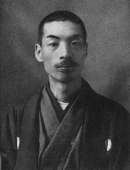Skip to: site menu | section menu | main content
Welcome To Democracy And Socialism .Com
Things should be made as simple as possible, but not any simpler- Albert Einstein
Hajime Kawakami (1879-1946) |
 |
Kawakami was a Japanese writer, poet, journalist, economist, and a fervent social justice activist. He was the eldest son of a former Samurai who was born on October 20, in Iwakuni, Yamaguchi prefecture in the south of Japan.
In 1902 he graduated from law school of the Tokyo Imperial University and began working as a journalist for Jomuri newspaper among others.
In 1913-14, Kawakami studied in Europe with a scholarship from the Ministry of Education. After his return, he began to work as an economic professor at the Kyoto University.
In the late 1920s, in the search of a solution to the problem of poverty and under influence of the October revolution in Russia, Kawakami became more and more interested in Marxism-Leninism. He translated the “Economic Interpretation of History” authored by Edwin Seligman from English to Japanese language. This book was the first analysis of dialectical materialism introduced in Japan.
During the February 1928 General Election, which was the first held in Japan following the passage of universal male suffrage, the banned Japanese Communist Party was very visible in its support of the legal socialist and labour-oriented political parties. This success alarmed the right-wing Conservatives.
Japanese Prime Minister, General Giichi Tanaka who’s Conservative Party retained its majority by only one seat ordered the mass arrest of known communists and suspected communist sympathizers. Some 1652 people were arrested on the March 15th incident, Hajime Kawakami was among them.
The young writer Kobayashi Takii, wrote his famous book “March 15, 1928” based on this incident. Kobayashi which disclosed the horrors of this incident, became himself a victim, arrested in 1933 and tortured to death, he was only 29 years old.
From 1930 to 1932, Japan experienced the deepest economic downturn during the famous Great Depression of the US, and other parts of the capitalist world. As a typical solution to save the exploitive systems, domestic oppression and foreign adventurism took place in Japan.
The military gradually took over the Government of Japan. On the 18th of September 1931, Japan invaded and seized Manchuria and east of Mongolia for the purpose of colonizing these parts of China.
Japanese military forces, namely the Imperial Japanese Army committed horrendous crimes during their occupation and colonization of China and various parts of East Asia. These terrible events have been labelled as an Asian Holocaust.
After having agreed not to resume his political activities, Kawakami was released from prison in 1937. In spite of experiencing intolerable political pressure he remained a convinced Marxist. In the remaining years until his dead, he secretly translated the first volume of Karl Marx Capital from German into Japanese. He also wrote essays, novels, poetry, and of course his multi-volume autobiography (Jijoden) which became a best-seller and was extravagantly admired as being incomparable in Japanese literature. “Jijoden” published posthumously after his death and the end of WWII in 1947.
Kawakami’s other famous works are:
Tales of Poverty (1917), in this book Kawakami described the miserable condition of working class in England, the same as jack London witnessed in 1902, and wrote about in his book The People of the Abyss in 1903.
Study of Social Problems (1919)
Study of the Materialist View of History (1919)
The Structure of Society and the Social Revolution (1922)
A brief Interpretation of the Materialist View of History (1922)
Introduce to Capital (1930-40)
Lenin’s Dialectic (1930-40)